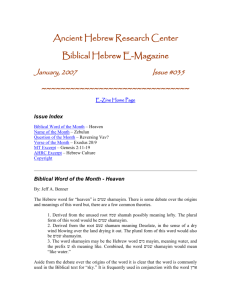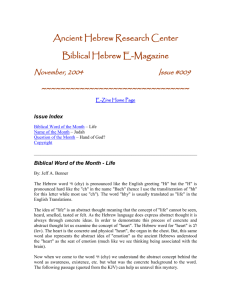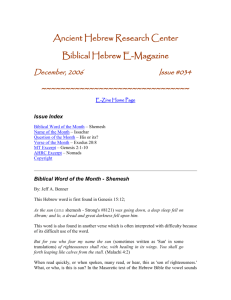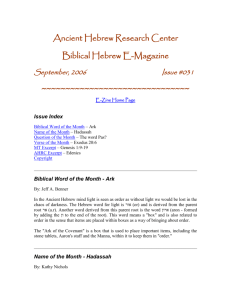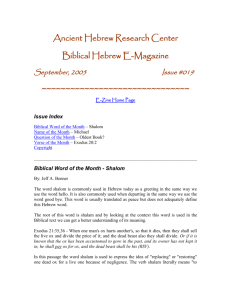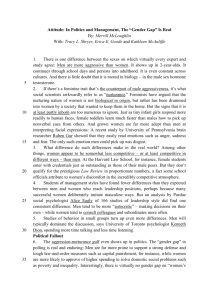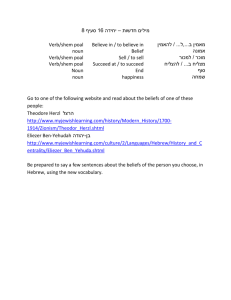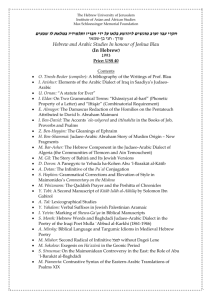Biblical Hebrew E-Magazine - Ancient Hebrew Research Center
advertisement
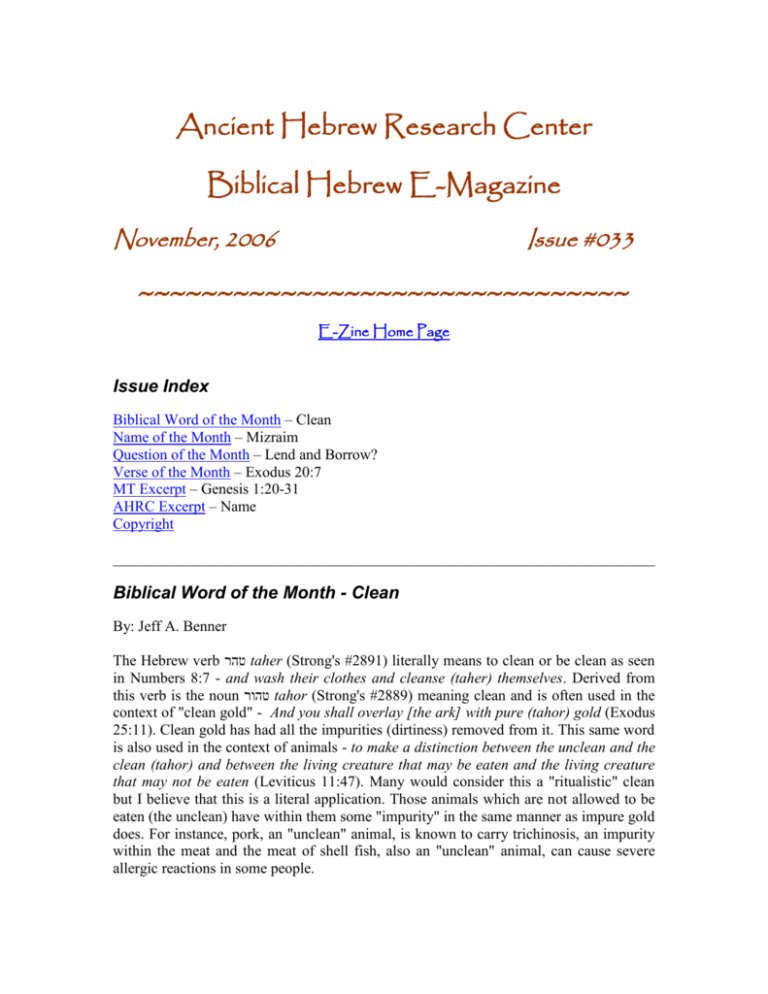
Ancient Hebrew Research Center Biblical Hebrew E-Magazine November, 2006 Issue #033 ~~~~~~~~~~~~~~~~~~~~~~~~~~~~~~~ E-Zine Home Page Issue Index Biblical Word of the Month – Clean Name of the Month – Mizraim Question of the Month – Lend and Borrow? Verse of the Month – Exodus 20:7 MT Excerpt – Genesis 1:20-31 AHRC Excerpt – Name Copyright ________________________________________________________________________ Biblical Word of the Month - Clean By: Jeff A. Benner The Hebrew verb טהרtaher (Strong's #2891) literally means to clean or be clean as seen in Numbers 8:7 - and wash their clothes and cleanse (taher) themselves. Derived from this verb is the noun טהורtahor (Strong's #2889) meaning clean and is often used in the context of "clean gold" - And you shall overlay [the ark] with pure (tahor) gold (Exodus 25:11). Clean gold has had all the impurities (dirtiness) removed from it. This same word is also used in the context of animals - to make a distinction between the unclean and the clean (tahor) and between the living creature that may be eaten and the living creature that may not be eaten (Leviticus 11:47). Many would consider this a "ritualistic" clean but I believe that this is a literal application. Those animals which are not allowed to be eaten (the unclean) have within them some "impurity" in the same manner as impure gold does. For instance, pork, an "unclean" animal, is known to carry trichinosis, an impurity within the meat and the meat of shell fish, also an "unclean" animal, can cause severe allergic reactions in some people. Biblical Hebrew E-Magazine When a person came into contact with a dead body they were considered "unclean" and were required to wash themselves with the ashes of the red heifer and in seven days they would be considered clean ( טהרtaher). Is this just a "ritualistic" procedure or a literal cleaning? The procedure for making the ashes of the red heifer is outlined in Numbers chapter 19. The red heifer was burned along with cedar wood (containing an irritant that causes one to vigorously scrub themselves), hyssop (containing carvacol, an anti-fungal and anti-bacterial agent) and scarlet stuff (tola'at in Hebrew, literally the Kermes worm and used as a natural anti-bacterial agent). This ash mixture becomes a potent antibacterial soap when mixed with water and is clearly a literal cleaning agent to remove the bacteria that can be transmitted by a dead body to the one who touches it. God's laws were not just a set of rituals with no physical substance, they were actual procedures for the preservation of life (i.e.: salvation) from injury or disease just as it says in Proverbs 3:1, 2; "My son, do not forget my teaching ( תורהtorah), but let your heart keep my commandments ( מצותmitsvot), for length of days and years of life and abundant welfare ( שלוםshalom, usually translated as peace but literally meaning whole or complete) will they give you." ________________________________________________________________________ Name of the Month - Mizraim By: Kathy Nichols The word is actually in the dual, possibly referring to the two Egypts – lower and upper. Mizraim was the brother of Cush (one of descendants of Noah). What did Egypt mean for the Ancient Hebrews? Broadly two things: a place of trouble or difficulty and a place of refuge. The Lord sent Joseph to Egypt ahead of his family to protect the Hebrew people from famine. However Joseph’s many troubles and afflictions prior to his family’s arrival are well known, and yet as it says in Acts 7:10 “...the Lord delivered him (Joseph) out of all his afflictions.” Not only this, but Joseph’s trials and troubles were used by God to form and mould Joseph into what He wanted him to be. Because Joseph allowed himself to be formed, he was used as a forerunner of his whole family who were able to join him in Egypt and became a strong nation there. However, the same place that became the refuge turned into the place of trouble and slavery later on. The Jews see Egypt as serving like a womb where they themselves were formed as a nation in very difficult circumstances. So when they were ready, God could bring them out of Egypt to establish a relationship with Himself and give them Torah. 2 Biblical Hebrew E-Magazine This applied to a degree also to Jesus whose young life was threatened by Herod. Math 2:13 “...the angel of the Lord appeared to Joseph in a dream saying “Arise and take the young child and His mother and flee into Egypt and stay there until I bring you word, for Herod will seek the young child to destroy Him.” So Egypt became a place of refuge for Jesus also. And like the Hebrew nation had been called out of Egypt, so also Jesus was. Mathew 2:15 says "...and was there until the death of Herod that it might be fulfilled which was spoken of the Lord by the prophet saying 'Out of Egypt I have called my son'…” So, what does the place of refuge and the place of trouble have to do with the name Egypt? Basically the root means “trouble” or “strait” – a narrow tight place or , from the same root, means “to press,” to situation which presses in. The word form something – like a potter fashioning a pot. Then lastly, the word means “flint” or “rock” often used as a refuge. All three are found in the AHLB under 1411. Psalm 32:7 says, "You are my hiding place, You will preserve ( ( ) me from trouble ) You will compass me about with songs of deliverance. Selah." _______________________________________________________________________ Question of the Month – Lend and Borrow? By: Jeff A. Benner Q: I noticed in Deut 28:12 that the word used for LEND (Strong's #3867) is also the same word used for BORROW. How can the same word have two completely opposite meanings? A: My standard comment about Strong's dictionary is that it is one of the best tools invented for people learning Hebrew but it is also the worst tool invented for people learning Hebrew. Strong's is great for people who do not know Hebrew to get a little exposure to it and learn a little more about the deeper meaning of Hebrew words but on the flip side Strong's has its limitations and if those limitations are not known it can create some problems, such as your question. It is true that the same Hebrew word is used for lending and borrowing but what Strong's cannot show you are the different tenses, prefixes, suffixes, moods and voices of each Hebrew verb. The Hebrew verb in question is lavah which literally means "to join" and is used in the context of borrowing in the sense of joining yourself to another. Where you see the word "borrow" the Hebrew has til'vah which means "you will join/borrow" (but the word preceding this is lo meaning "not" so it would then be translated as "you will not join/borrow." Where you see the word "lend" the Hebrew has vehilviyta which means "and you will cause to join/borrow." The main difference between the two is that the first one, til'vah is in the qal (or simple) form while the second is in the hiphil (or causative) form. 3 Biblical Hebrew E-Magazine ________________________________________________________________________ Verse of the Month – Exodus 20:7 By: Jeff A. Benner ת־שם־יְהוָּׂ ה אֱ ֹלהֶ יָך לַשָּׂ וְ א כִ י ל ֹא ְינ ֶַקה יְהוָּׂה ֵׁ ל ֹא ִת ָּׂשא ֶא ת־שֹמו לַשָּׂ וְ א׃ ְ ֵׁאת אֲ שֶ ר־יִשָּׂ א ֶא Thou shalt not take the name of Jehovah thy God in vain; for Jehovah will not hold him guiltless that taketh his name in vain. (ASV) ( ל ֹאlo) This word means "no" or "not" and is commonly used to negate the following verb. ( ִתשָּׂ אti-sa) The base word is ( נשאnasa), a verb meaning "to lift up" but can be used in a wide sense. The prefix ( תti) identifies the subject of the verb as second person, masculine, singular and the tense of the verb as imperfect. Combined, with the previous word ( לאlo meaning not), the translation would be "you will not lift up." ( ֶאתet) This word identifies the following word as the direct object of the verb. ( שֵׁ םsheym) This word means "name" but more Hebraic as the character of the individual. ( ְיהוָּׂהYHWH) This is the name of God. ( אֱ ֹלהֶ יָךe-lo-hey-kha) The base word is ( אלוהe-lo-ah) literally meaning "one of power and authority" but usually translated as "God." ( לַשָּׂ וְ אla-sha-ve) The base word is ( שואshe-va), a noun meaning emptiness in the sense of vanity or falseness. The prefix ( לla) means "to" or "for." ( כִ יkiy) This word means "because" or "for." 4 Biblical Hebrew E-Magazine ( ל ֹאlo) Again, this word means "no" or "not" and usually negates the following verb. ( ְינ ֶַקהye-na-qah) The base word is ( נקהna-qah), a verb meaning "to acquit," to declare one innocent of an offense. The prefix ( יye) identifies the subject of the verb as third person, masculine, singular and the tense of the verb as imperfect. ( ְיהוָּׂהYHWH) The name of God. This is the subject of the previous verb. ( ֵׁאתeyt) Again, this word identifies the following word, or in this case the next two words, as the direct object of the verb. ( אֲ שֶ רa-sher) A word meaning which, who or what and is closely connected to the following word. ( יִשָּׂ אyi-sa) The base word is ( השאnasa), a verb meaning "to lift up" but can be used in a wide sense. The prefix ( יyi) identifies the subject of the verb as third person, masculine, singular and the tense of the verb as imperfect. Combined, the translation would be "he will lift up." Because of the previous word, asher, these words would be translated as "who lifts up." ( ֶאתet) Again, this word identifies the following word as the direct object of the verb. ( ְשֹמוsh-mo) The base word is ( שםshem), a noun meaning "name" but, more Hebraic as "character." The suffix ( וo) means "of him" or "his." ( לַשָּׂ וְ אla-sha-ve) Again, the base word is ( שואshe-va), a noun meaning emptiness in the sense of vanity or falseness. The prefix ( לla) means "to" or "for." The following is a literal rendering of this verse from its Hebraic meaning. You will not [lift up / represent] the character of Yahweh your powerful one of authority [as emptiness / falsely] because Yahweh will not acquit one who [lifts up / represents] his character [for an emptiness / falsely] In following issues we will continue with this chapter. 5 Biblical Hebrew E-Magazine ________________________________________________________________________ Mechanical Translation Excerpt - Genesis 1:20-31 20 and Elohiym said, the waters will swarm, swarmers of beings of life and flyers will fly upon the land upon the face of the sheet of the sky, 21 and Elohiym fattened the magnificent taniyns and all of the beings of the life, the treading ones which swarm the water to their species and all of the flyers of the wing to his species and Elohiym saw that it was functional, 22 and Elohiym respected them saying, reproduce and increase and fill the water in the seas and the flyers increased in the land, 23 and evening existed and morning existed a fifth day, 24 and Elohiym said, the land will bring out beings of life to her species, beasts and treaders and his living ones of the land to her species and he existed so, 25 and Elohiym made living ones of the land to her species and the beast to her species and all of the treaders of the ground to his species and Elohiym saw that it was functional, 26 and Elohiym said, we will make a human in our image like our likeness and he will rule in the swimmers of the seas and in the flyers of the sky and in the beast and in all of the land and in all of the treaders treading upon the land, 27 and Elohiym fattened the human in his image, in the image of Elohiym he fattened him, male and female he fattened them, 28 and Elohiym respected them and Elohiym said to them, reproduce and increase and fill the land and subdue her and rule in the swimmers of the seas and in all the living ones treading upon the land, 29 and Elohiym said, look, I gave to you all of the herbs sowing seed which are upon the face of the land and all of the trees which are in him, produce of the trees sowing seed for you will exist for food, 30 and to all of the living ones of the land and to all of the flyers of the sky and to all of the treading ones upon the land which is in him a being of life, all of the green herbs for food and he existed so, 31 and Elohiym saw all of which he made and look, it is much functional and evening existed and morning existed a sixth day For details on this new translation see the web site at http://www.mechanical-translation.org _______________________________________________________________________ AHRC Website Excerpt – Name When we see a name such as "King David" we see the word "King" as a title and "David" as a name. In our western mind a title describes a character trait while a name is simply an identifier. In the Hebrew language there is no such distinction between names and titles. Both words, King and David, are descriptions of character traits, King is "one who reigns" while David is "one who is loved". It is also common to identify the word "Elohiym" (God) as a title and YHWH (Yahweh, the LORD, Jehovah) as a name. What we do not realize is that both of these are character traits, YHWH meaning "the one who exists" and Elohiym is "one who has power and authority". The Hebrew word "shem" more literally means "character". When the Bible speaks of taking God's name to the 6 Biblical Hebrew E-Magazine nations, he is not talking about the name itself but his character. The command to not take God's name in vain literally means not to represent his character in a false manner. It is similar to our expression of "having a good name" which is not about the name itself but the character of the one with that name. More vocabulary words can be found on the web site at http://www.ancient-hebrew.org/27_home.html ________________________________________________________________________ Copyright © 2006 Jeff A. Benner Ancient Hebrew Research Center Please feel free to use, copy or distribute any material within the "Biblical Hebrew E-Magazine" for nonprofit educational purposes only. ________________________________________________________________________ 7
